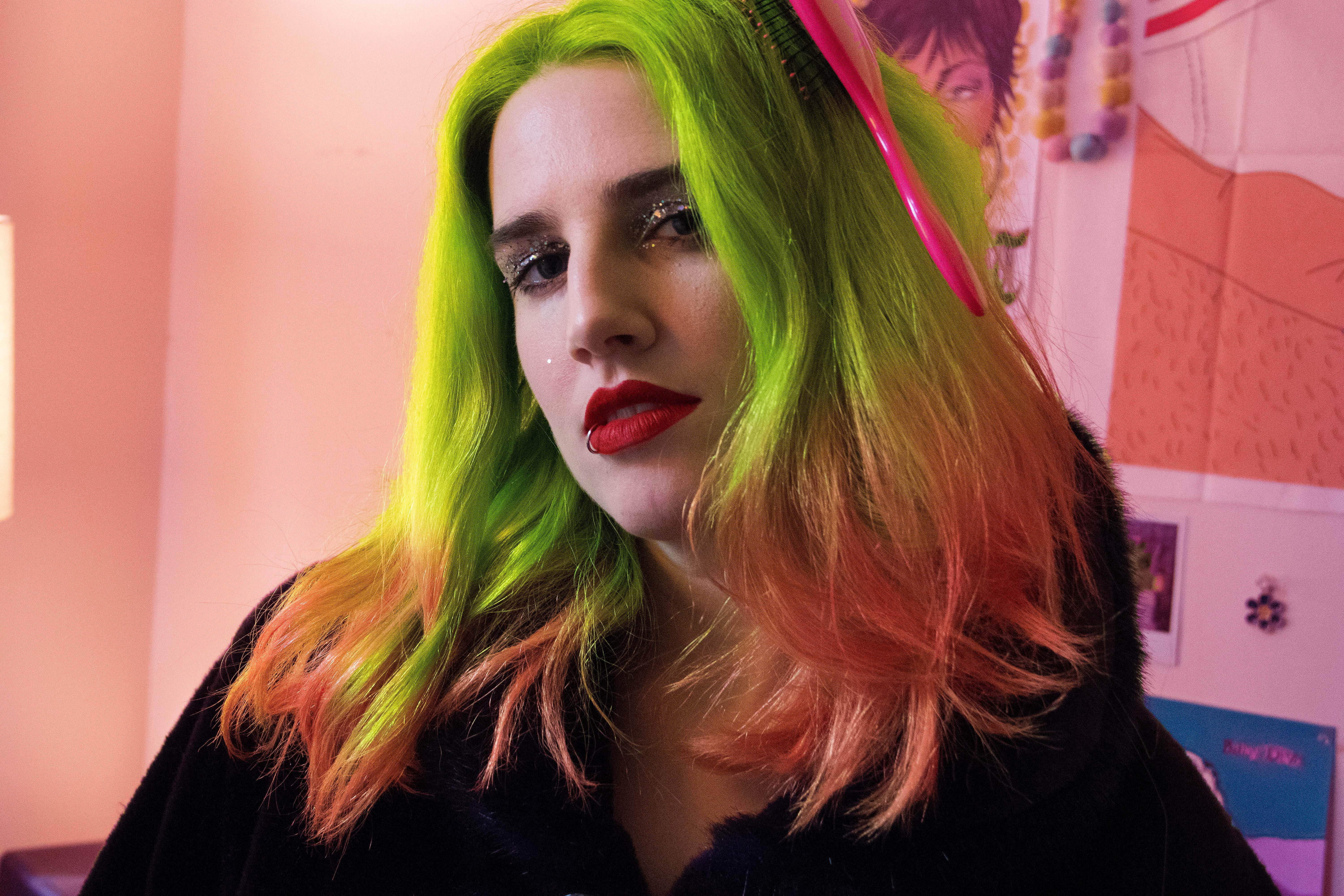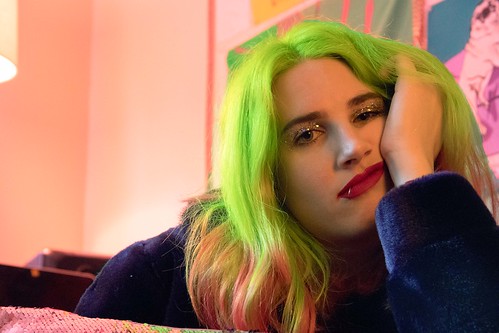
Sir Babygirl makes their entire life a performance and they don’t mind you knowing that.
They’re the DIY pop prince(ss) who is building their own empire from the ground up. “I’m really into structure,” they note from their perch on their desk, surrounded by colorful prints of pop stars and a minor shrine to their dead dog. “It’s the driving force in the shit I make. It’s organized chaos, and I have to be in control to have moments of not being in control. I think being called calculated is one of the biggest compliments.”
Thriving in organized chaos is an apt description of Kelsie Hogue. The past two years have been a lifetime of experiences – they came back from Chicago to reset and live with their parents in New Hampshire, getting back into creating music and going about recording their first solo project. They created a “hodge-podge studio” and set about writing, producing, and engineering their album, but quickly ran into some issues around production. “My head hears all the beats pristinely, but I can’t manifest that yet with my engineering skills. It just got to the point where I was not getting the product I wanted, and it wasn’t worth releasing anything that doesn’t sound like exactly what I want.” That wasn’t going to work for Hogue; their music has been a source of escape, expression, and enacting of self that was entirely “precious.” The fledgling pop star was not willing to settle. “It’s taken me so long now to get where I am so why would I?”
Hogue has been sitting on her upcoming album for years in its rawest form but hasn’t had the means to truly delve into creating such a large undertaking. “I got home and I realized I didn’t understand how the industry worked. I had no direct ins, family connections, and I didn’t have a huge bankroll. […] I had no idea how to enter so I started working and taking everything I had written but I realized I didn’t like working in a vacuum. I didn’t want to work alone but I wanted to be in complete creative control.” Not compromising on that control ended up steering Hogue to working with Boston based engineer Lee Schuna, who Hogue gives the glowing credit of “the only engineer I’ve worked with who’s not creepy and not cis.” That departure from the expected experience of collaboration helped Hogue identify what they were able to control but also what they were able to accept from themselves and the people they worked with. “I’ve been so lucky that I’ve been able to pick up so many people that are so well suited for each other because I took that leap of faith. I was able to say, ‘I’m going to be vulnerable and completely alone for a minute and allow that and that’s fucking scary but it’s scarier to be dependent [on someone I can’t trust].’”
The necessity of being able to rely on others and the comfort in asserting their vision has been a work in progress for Hogue. They recount their time in Chicago as a period of isolation and a forced break from music due to the vocal nodules that they had developed. Despite this emotionally tumultuous process, Hogue has come out of the process with more self knowledge and comfort in existing alone.
“All I would do at night was watch pop music videos and try to figure out how people like Halsey got from point A to point B. It was an obsession with trying to figure out the structure of the pop industry and what I could gleam from the outside,” Hogue remarks on nights spent infatuated with the power chord driven production of Max Martin and stars like Avril Lavigne, Grimes, and Charly Bliss. They phrase their obsession with the pop rock genre like a crush, which to them is fueled by curiosity and “the idea that [a] crush ends when the curiosity is sated.” Their debut LP is aptly named Crush on Me, as a cheeky nod to how “we’re so militant about self-love.” Hogue explores herself on the album but believes “a crush on yourself is keeping curiosity aflame instead of being settled and married to the way you are.” The sentiment echoes Hogue’s devotion to self-improvement and adjusting for growth, stating “The self-love that works for me is discipline and actually being disciplined with myself.”
It was during her time in Chicago that Hogue began to center comedy in their life, a driving influence that can be felt in their internet presence and overall attitude. Hogue refers to herself as a ‘gay clown’ at several points in our conversation, and the conceptualization isn’t far off. Their sound is entertainment for the masses, and Hogue knows it, “It’s bubblegum pop, you chew it and the flavor’s gone and you have to come back to it and pop in another piece.” If anything, Hogue is more the ringleader of her own circus, comfortable commoditizing an act that is half spectacle and half freak show. There is tragedy and calamity but also celebration and elation. It harkens back to Britney Spears’ Circus era but without the desperation of escape; this is someone putting on a show with intention and control, an exposure of what makes them vulnerable and a celebration of living with the differences that others center. “People ask why I make [being queer] part of my brand and I’m like ‘First off, it’s who I am so it’s inherent in the music.’ I’m sorry, but every straight person has a marketing strategy. Everyone has a marketing strategy and Britney Spears is marketed as straight and that is a campaign. That’s a campaign choice and it’s no different than marketing as queer.”
This level of calculation may cause discomfort to others but Kelsie doesn’t cater to comfort. Our conversation stands out as one of the most transparent I’ve had with an artist, especially regarding the business aspects of their music. Kelsie doesn’t mind us peaking behind the curtain, welcoming it, and making us know how central branding is to their performed identity. “It’s been my choice to have campaign hair.” The hair in reference is a freshly dyed neon green melting into a orangey pink, the colors used on all of Hogue’s promotions for their album. It’s the first thing we discuss as I enter their Brooklyn apartment, the newest marketing strategy they have employed. “No one’s forcing me and I’m putting the gun to my own head being like, ‘You need campaign hair, bitch!’ […] I do my own hair, and that’s the level of resourcefulness I know I wouldn’t have if I was a trust fund kid. That’s something I hold near and dear.”
The mention of the all-too-popular story of wealthy, connected people entering the music industry is the launchpad of a rant for everyone in DIY. “There’s so much gaslighting in an industry where people are brushing over their origin stories and the fact that they just decided one day they were going to do it and they already had the door open.” Hogue is very familiar with how alienating and isolating it is to not be aware of this while trying to break into the industry, “It makes people who don’t have those connections feel crazy and that makes me sad so I try to be really transparent about where I’m coming from.” It’s this radical transparency that has drawn me to Hogue since we met during her time at university. As much as they perform and entertain, they let us peak behind the curtain to reveal the truth we all suspect. There is no smoking gun, no guilt or anger over privilege, only the sense of responsibility and desire to utilize privilege productively for themselves and others. Hogue’s comfortable, middle class, white background is not radical in itself, but their acknowledgement of it is. “It’s not like I have the energy to be bitter and I don’t give a shit if you are a trust fund kid but it’s like what are you doing with it?”
If you pose that question back at Kelsie, their normalization of the queer experience is the obvious answer. “I want to teach people they don’t have to directly relate to it to feel it, [..] I don’t give a shit if you don’t have the experiences I’m writing about.” The desire Hogue feels is not to dilute their own narrative to cater to everyone, but for everyone to enjoy their narrative.
And it’s working.
Hogue moved to NYC a week before the release of their debut single, ‘Heels,’ which led to a flurry of press surrounding the song and the colorful artist behind it. Things haven’t slowed down for Kelsie; despite going into their release with no expectations, they now have a full team coming together to execute their vision.
“I went to L.A. to shoot the ‘Haunted House’ music video and that was insane and amazing. Then Petal hit me up and asked me to come on tour.” I interrupt to remind them that they were doing all of this with two songs out and they cackle with me, screaming, “Only on Soundcloud and Bandcamp, not even Spotify! I always forget that, I need to remind myself. I’m older, I’m 26 and that’s the age of Miley, Arianna, Demi – all the people who are at the top of the pop game are so far ahead of me, it’s insane. I’m not saying I’m them but that’s the world I aspire to be in. I call it my healthy delusion because the more I fed into doing pop the more I was like, you know what? I want to decentralize pop music, and why can’t I be at that level someday? Just because I don’t have an in? Fuck that, make your own fucking in.”
Crush on Me is out February 15th via Father/Daughter Records and you can catch Sir Babygirl on tour with Petal now, coming to Boston on 1/27/19 at Brighton Music Hall, presented by Allston Pudding.
Facebook Event | Tickets | All Ages | Brighton Music Hall | Doors @ 7PM |$15

